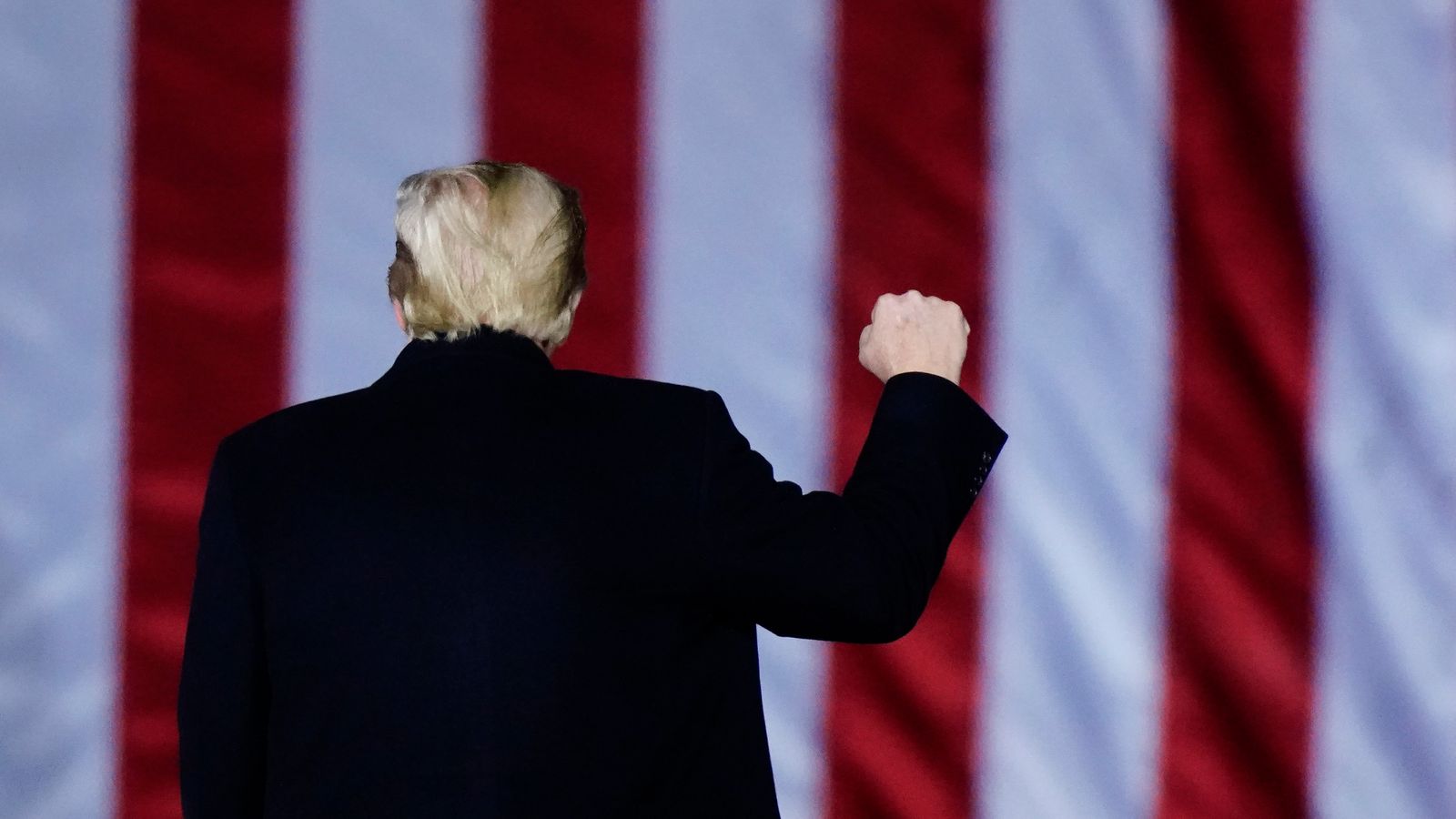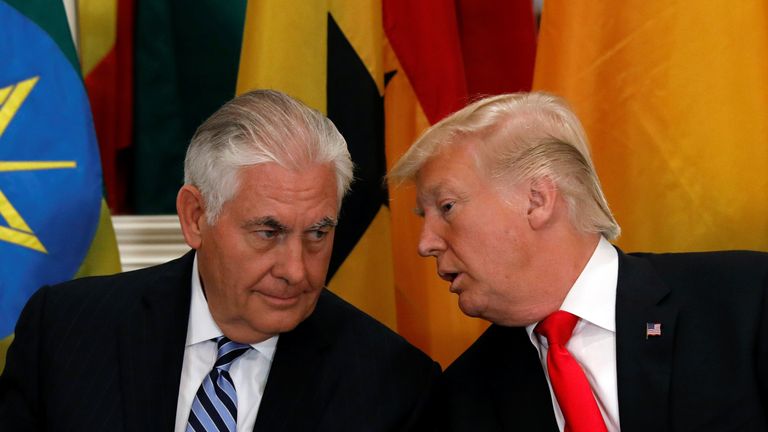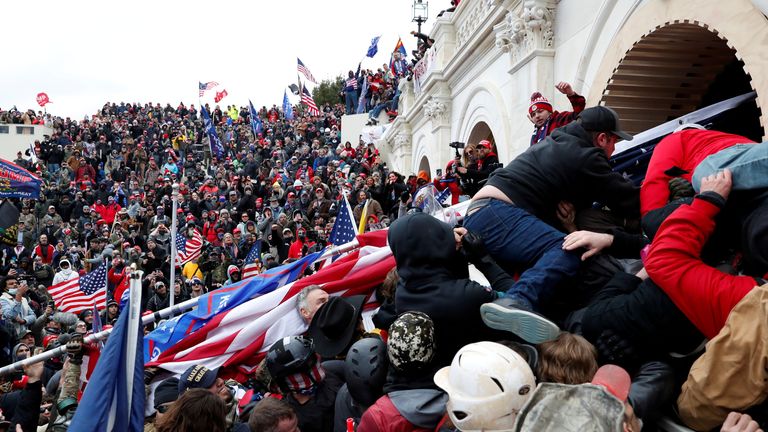It is fair to say most of America’s business leaders never took to Donald Trump.
Now, in the dying days of what has arguably been the most divisive presidency in US history, the gloves are off.
US business leaders are taking to the airwaves and queuing up to condemn the outgoing president for egging on those who violently stormed the US Capitol this week.
Some have been firing employees who were identified as participating in the rioting.
And others have sought to reduce Mr Trump’s ability to campaign or to make money from merchandise sales, such as Shopify, the Canadian e-commerce giant whose platform previously hosted two of his websites.
This has been a long time coming.
Even before his election in November 2016, it was notable how few business chieftains were prepared to support Mr Trump publicly.
By contrast his Democrat rival that year, Hillary Clinton, could unveil a string of endorsements from business leaders.
These did not only include well-known Democrat supporters such as Warren Buffett, the investment titan, Reed Hastings, the Netflix founder and Eric Schmidt, then chief executive of Google’s parent Alphabet.
They also included lifelong Republican supporters such as Jim Cicconi, a senior executive at the telecoms giant AT&T, who had worked at the White House under both Ronald Reagan and George HW Bush.
Other lifelong Republicans who endorsed Mrs Clinton included Dan Akerson, the former chairman and chief executive of General Motors, and Meg Whitman, the former chief executive of Hewlett-Packard.
The US Chamber of Commerce, the biggest US business lobbying organisation and usually a reliable Republican supporter, also campaigned against Mr Trump, flagging its concerns at what was seen as his protectionist policies.
The mood among business leaders in 2016 was best summed-up by Barry Diller, the billionaire head of online giant IAC, a previous supporter of Democrats but also of the former Republican presidential candidate John McCain.
He said: “Donald Trump, all he is is about conflict, and all that he is is negative conflict. He’s a self-promoting huckster who found a vein. A vein of meanness and nastiness.”
After he was elected, Mr Trump sought to get business leaders onside, appointing Rex Tillerson, the former chairman of oil giant Exxon, as his first secretary of state.
At the same time, he appointed Gary Cohn, a former chief operating officer of the investment bank Goldman Sachs, as director of his National Economic Council.
He also set up a Strategy & Policy Forum, led by Steve Schwarzman, chairman and chief executive of the private equity giant Blackstone, which included leaders from blue-chip companies such as Disney, Walmart and IBM.
He also delighted business early in his presidency with the biggest single shake-up of the complex US tax system in three decades, cutting the US corporation tax rate from 35% to 21%, immediately increasing competitiveness.
Businesses responded by handing back some of the money saved to employees.
Yet cracks soon began to appear in the relationship between Mr Trump and business leaders.
Within weeks of taking office, the president signed an executive order banning travel to the US from seven Middle Eastern countries, drawing criticism from Ford, Goldman Sachs and Starbucks.
Members also began resigning from Mr Trump’s Strategy & Policy Forum.
The first to leave, in protest at Mr Trump’s immigration policy, was Travis Kalanick, the Uber founder, who stepped down in February 2017.
Four months later, he was followed by Disney’s Bob Iger and Tesla’s Elon Musk, who were angered by Mr Trump’s decision to withdraw the US from the Paris climate accord.
Two months later, Mr Trump drew more criticism with his reaction to violence at a white nationalist rally at Charlottesville, Virginia.
Ken Frazier, chairman and chief executive of the drugs giant Merck and one of the country’s most prominent African-American executives, responded by stepping down from the president’s American Manufacturing Council.
He was followed by Brian Krzanich, the chief executive of Intel and Kevin Plank, the chief executive of Under Armour.
Within days, members of the Strategy & Policy Forum had spoken with each other and agreed to wind up the body but, before they could announce the move, Mr Trump used Twitter to announce he was disbanding both the forum and the manufacturing council.
Charlottesville was a key moment in which many business leaders broke permanently with Mr Trump.
At the same time, highlighting his weak response to the violence, a number of companies – including Visa, Mastercard, PayPal, American Express and, later, Apple – prevented white supremacist websites from using their payment services.
Mr Trump continued to alienate business people by erecting tariffs on a range of imported products and sparking – or intensifying – trade disputes with China and the EU while Mr Tillerson was shown the door in March 2018.
If Charlottesville was one key moment in the relationship between business leaders and Mr Trump, the next was the Black Lives Matter protests, which prompted scores of businesses to speak about stridently about racial inequality.
Come last year’s election, no major business leaders endorsed Mr Trump, while within days his successor, Joe Biden, had held virtual meetings with a number of top business leaders.
This week’s violence in Washington DC – and Mr Trump’s response to it – has only reinforced the sense of relief most of corporate America’s leaders feel at his imminent departure.
Nelson Peltz, the billionaire investment manager, told CNBC: “I voted for Trump in this past election, November, and today I am sorry I did that.”
The Business Roundtable, which represents 200 of America’s largest corporations and which is currently chaired by the Walmart chief executive Doug McMillon, said on Wednesday: “The chaos unfolding in the nation’s capital is the result of unlawful efforts to overturn the legitimate results of a democratic election. The country deserves better.
“Business Roundtable calls on the president and all relevant officials to put an end to the chaos and to facilitate the peaceful transition of power.”
And perhaps most powerfully, the National Association of Manufacturers, whose board includes leaders of Dow Chemical, Exxon and General Electric, urged Mike Pence, the vice president, to consider invoking the 25th Amendment to remove Mr Trump from office.
It is perhaps no surprise that business leaders had little in common with Mr Trump. They believe in globalisation and trade without tariffs. Mr Trump did not.
What will be interesting to see is how many of them, now seemingly cosying up to Mr Biden, go back to the Republicans if the latter ditches the Trump baggage and reverts to being a party of free trade.


